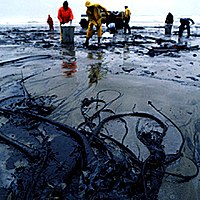
Photo from wikipedia
ABSTRACT The aim of this study was to assess the impact of soil inoculation with the Rhodococcus erythropolis CD 106 strain on the effectiveness of the phytoremediation of an aged… Click to show full abstract
ABSTRACT The aim of this study was to assess the impact of soil inoculation with the Rhodococcus erythropolis CD 106 strain on the effectiveness of the phytoremediation of an aged hydrocarbon-contaminated [approx. 1% total petroleum hydrocarbon (TPH)] soil using ryegrass (Lolium perenne). The introduction of CD 106 into the soil significantly increased the biomass of ryegrass and the removal of hydrocarbons in planted soil. The fresh weight of the shoots and roots of plants inoculated with CD 106 increased by 49% and 30%, respectively. After 210 days of the experiment, the concentration of TPH was reduced by 31.2%, whereas in the planted, non-inoculated soil, it was reduced by 16.8%. By contrast, the concentration of petroleum hydrocarbon decreased by 18.7% in non-planted soil bioaugmented with the CD 106 strain. The rifampicin-resistant CD 106 strain survived after inoculation into soil and was detected in the soil during the entire experimental period, but the number of CD 106 cells decreased constantly during the enhanced phytoremediation and bioaugmentation experiments. The plant growth-promoting and hydrocarbon-degrading properties of CD 106, which are connected with its long-term survival and limited impact on autochthonous microflora, make this strain a good candidate for improving the phytoremediation efficiency of soil contaminated with hydrocarbons.
Journal Title: International Journal of Phytoremediation
Year Published: 2017
Link to full text (if available)
Share on Social Media: Sign Up to like & get
recommendations!